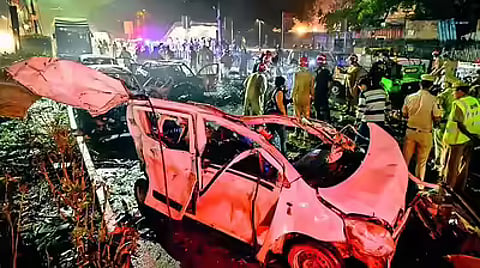
- Home
- Live Blog
- Breaking News
- Top Headlines
- Cities
- NE News
- Sentinel Media
- Sports
- Education
- Jobs

New Delhi: Security agencies have recovered three bullet cartridges, including two live ones, from the debris at the Red Fort blast site. This recovery added more complexity to the probe into the November 10 explosion that killed 13 people and injured more than two dozen. The financial trail is also widening, with a hawala link under scrutiny, as foreign funding of Rs 20 lakh was uncovered by investigators. A source involved in the investigation said 9mm rounds, found near the burnt Hyundai i20 that exploded, are not permitted for civilian use.
“Personnel deployed at the spot were asked to check their issued ammunition, but none was missing. The cartridges were there, but no weapon. We are trying to understand how the bullets reached the spot,” the source said.
Investigators are also preparing a full reconstruction of accused Umar Nabi’s movements, tracing his route from Faridabad to Nuh and then to Delhi. Teams are examining call records, tower locations and CCTV footage from more than 50 cameras. Every check-post crossed, parking entry made and halt recorded will be plotted to determine whether Umar met anyone on the way, was followed or got assistance.
A hawala link is also under scrutiny, after indications that arrested doctors Muzammil and Shaheen may have received nearly Rs 20 lakh from foreign handlers.
About Rs 3 lakh is suspected to have been spent on fertiliser, while investigators suspect the bomb could have contained TATP (Triacetone Triperoxide) — the volatile explosive nicknamed “mother of satan”.
TATP is an extremely volatile explosive compound known for its high sensitivity to friction, heat and even mild physical contact. Unlike military-grade explosives, TATP can be manufactured using easily available chemicals such as acetone, hydrogen peroxide and an acid catalyst, making it a preferred choice for terror networks seeking to avoid detection. Its instability makes transportation and handling extremely dangerous, as even minor impurities can trigger an unintended explosion. (Agencies)
Also Read: Delhi blast: Crime branch registers 2 FIRs against Al-Falah University